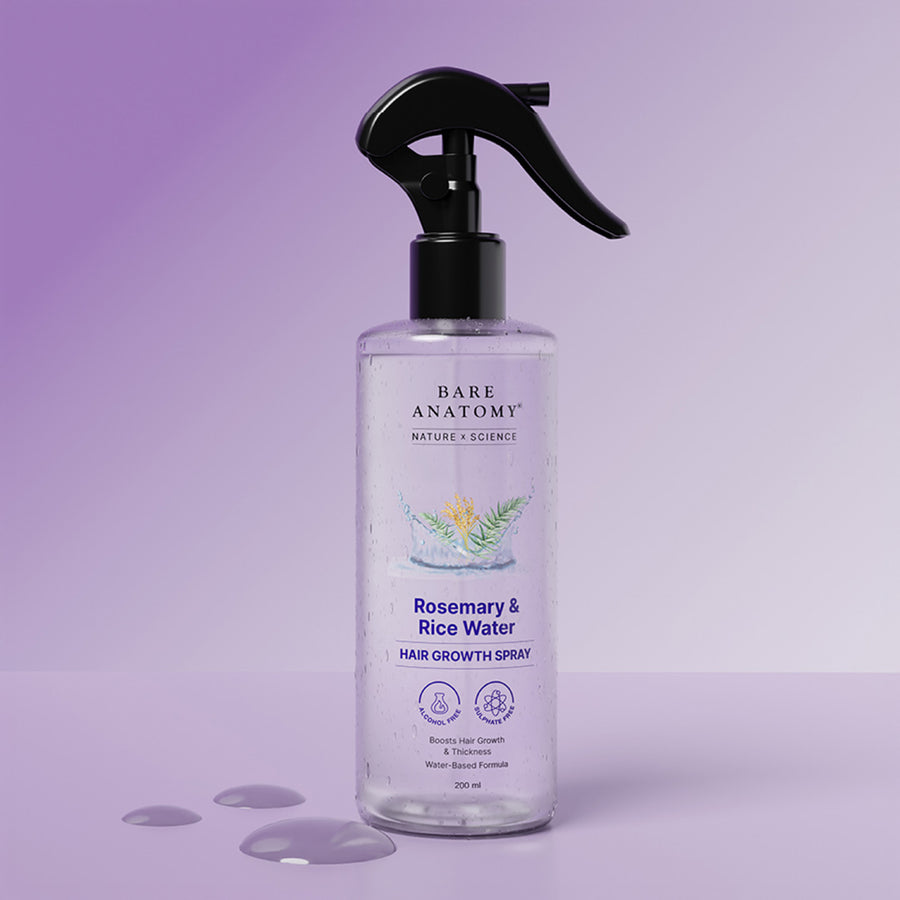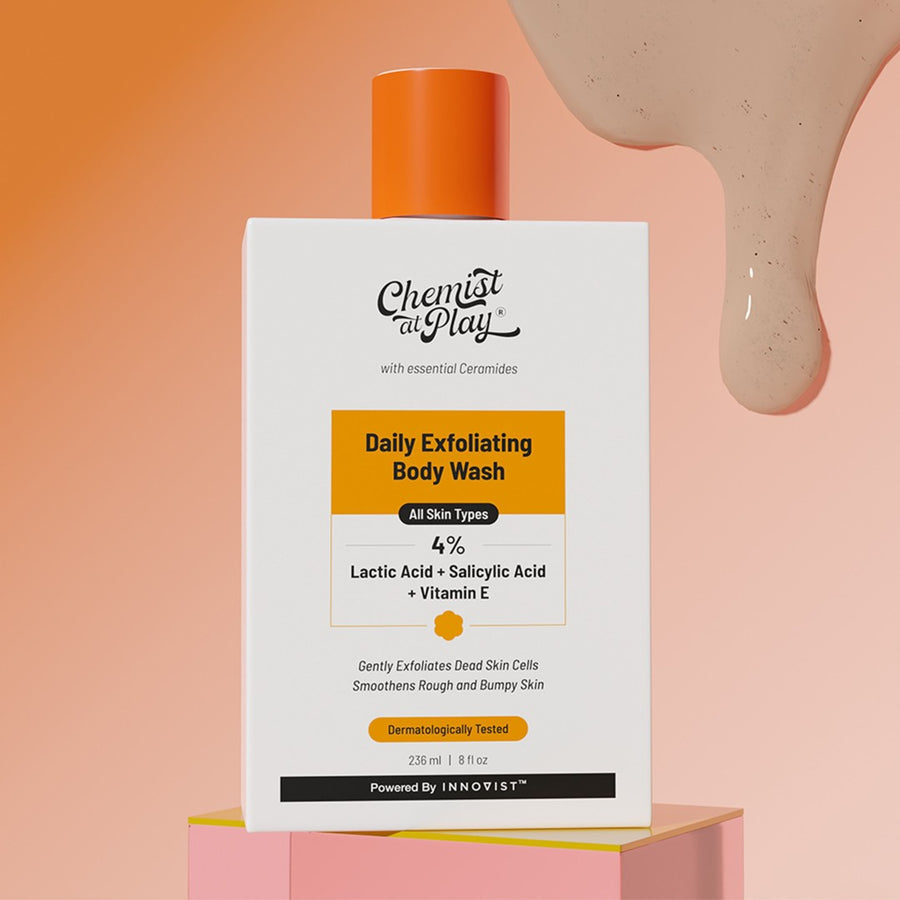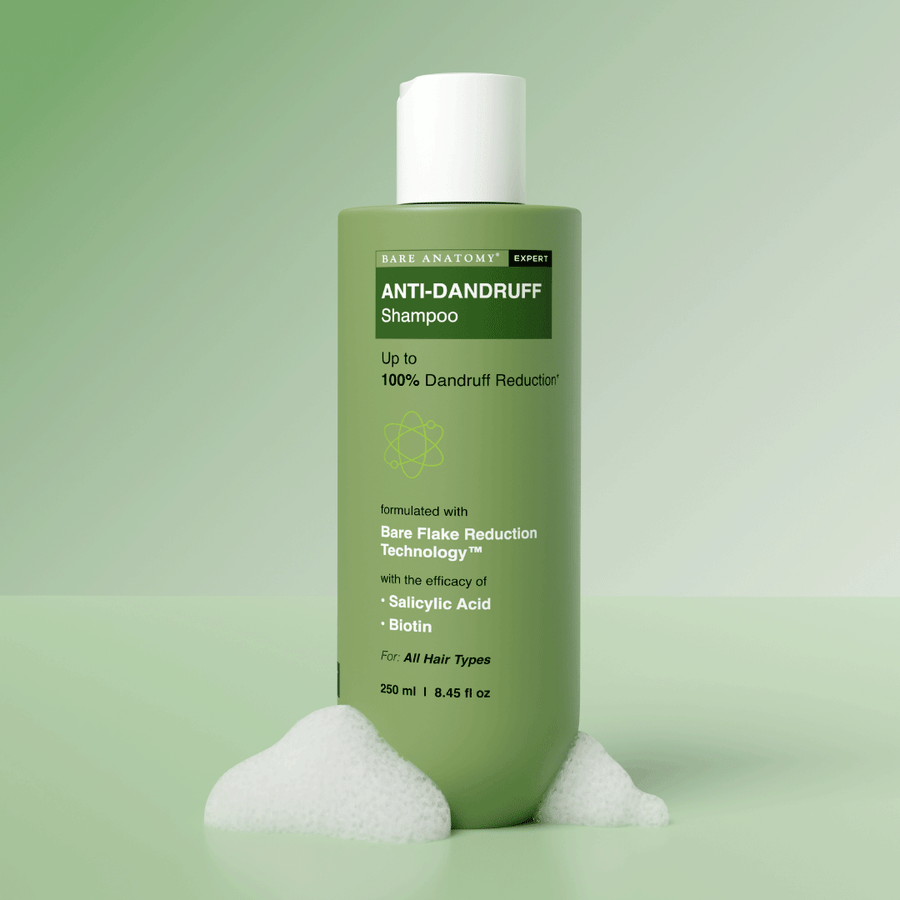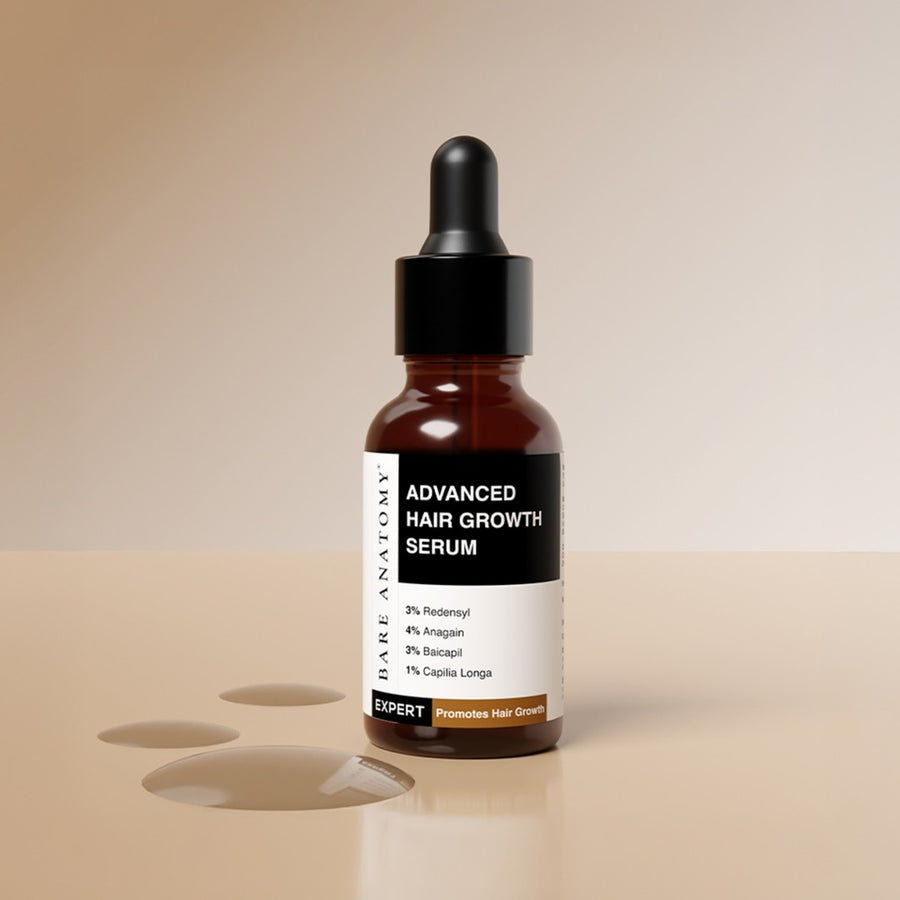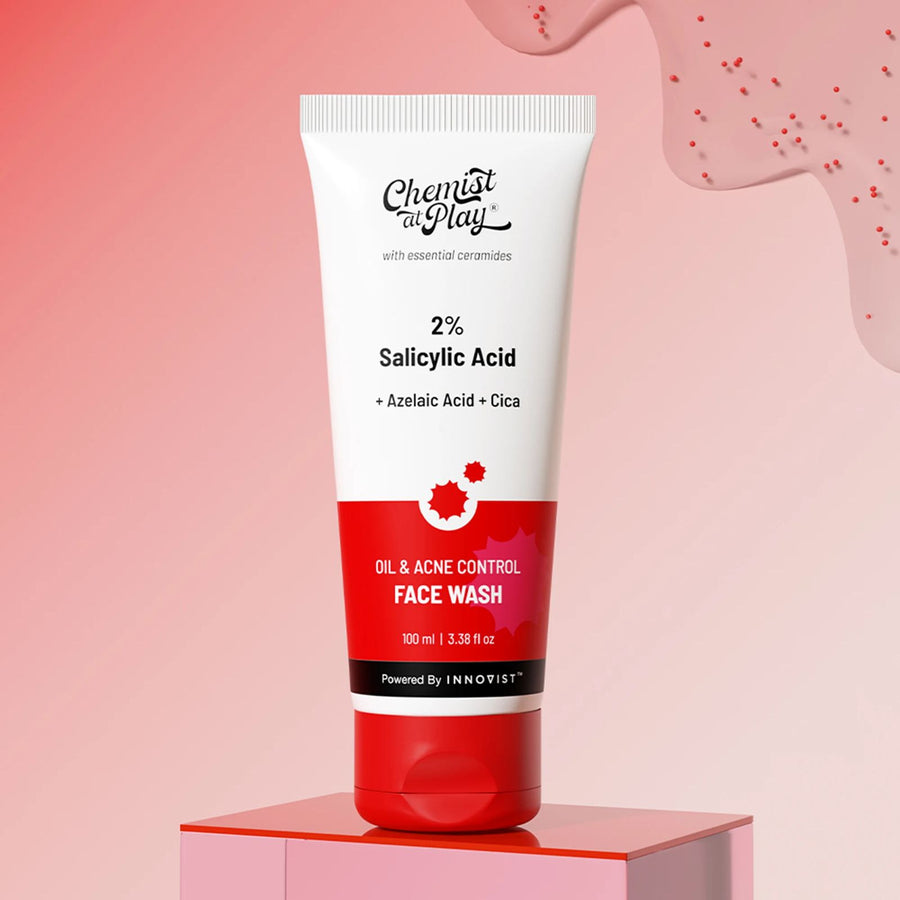The main reason for an oily scalp is the excessive production of sebum, a natural oil released by your sebaceous glands on your scalp. This oil is essential for protecting the scalp and keeping hair hydrated.
Although sebum is necessary for a healthy scalp, excess levels mixed with sweat can cause oily hair that feels greasy, looks limp and is hard to manage.
To break this cycle of oil imbalance, switching to a targeted yet gentle hair care routine can help in oily scalp treatment.
In this guide, we’ll decode why sebum build-up occurs and share ways to manage an oily scalp, without drying out your hair.
Understanding the Sebum & Scalp Connection
The scalp is an extension of your skin, and like facial skin, it has sebaceous glands that make sebum, a natural oil to moisturize and protect the scalp and hair shaft.
This protective natural oil creates a film on the scalp and along the hair shaft, retaining moisture and protecting against environmental damage.
However, when sebum production is more than your scalp requires, it may combine with sweat, dirt, and dead skin cells, leading to clogged follicles causing an oily scalp and oily hair.
The sebum composition may differ between individuals depending on age, diet, and skin health. This affects how oily your hair feels on a day-to-day basis. Thus, it’s important to identify the underlying triggers that may cause sebum buildup on the scalp, so that you can select a product that meets your oily hair treatment needs.
What Triggers Sebum Overproduction?
Various internal and external influences can send your sebaceous glands into overdrive. Understanding these can help manage an oily scalp and prevent oily and greasy hair. Here are some common yet often overlooked triggers:
Hormonal fluctuations
Thyroid function & androgen changes, particularly during puberty, menstruation, pregnancy, or PCOS, can alert your body to secrete more sebum. This hormonal change is the most prevalent cause of having an oily scalp, particularly in women between their 20s & 40s.
Genetic predisposition
Your genes may naturally influence how much sebum your scalp produces. If oily skin or oily hair runs in your family, you’re likely to inherit the same scalp tendencies. Studies suggest that nearly 50% of sebum output variability is genetically determined.
Humidity and weather
Oily scalps get worse in warm, humid climates. High temperatures cause more sweating, which combines with excess sebum, trapping dirt and clogging follicles. This residue makes your oily scalp sticky and hair greasy, even within a few hours of washing.
Over-washing & harsh shampoos
Regular washing of your hair, particularly with sulphate-based shampoo, dries out the oils on the scalp. This has a rebound effect, whereby your glands produce more sebum to make up for the lost oil, forming a dryness-oiliness cycle.
Product buildup & poor scalp hygiene
Excessive use of heavy conditioners, styling creams, or oils can clog pores on your scalp. When all these products combine with sebum, sweat, and dead skin cells, they create a sticky layer that suffocates the scalp, leading to persistent oily hair and dullness.
Unbalanced diet and lifestyle
High-sugar, high-fat diets and lack of quality sleep can trigger inflammation and hormonal imbalance, both of which affect sebum production. Even chronic stress has been found to increase cortisol levels, indirectly leading to oiliness and flakiness on the scalp.
Medical conditions
Underlying conditions such as seborrheic dermatitis, fungal infection of the scalp, or hormonal imbalances (such as hypothyroidism or PCOS) may result in excessive sebum production. These conditions tend to require both external treatment and internal medical support for long-term improvement.
How to Manage Excess Sebum Without Over-Drying the Scalp?
Fixing an oily scalp doesn't mean stripping away all its natural oils. Doing so will send your scalp into overdrive and produce even more sebum to compensate for the loss. The trick is to balance your scalp's oil levels, without disturbing its natural barrier. Here's how:
Use a Sulphate-Free Shampoo
Traditional clarifying shampoos often contain harsh sulphates that dry out both the scalp and hair. Instead, choose a sulphate-free shampoo specifically formulated for oily scalps.
Look for ingredients like Salicylic Acid to gently exfoliate scalp buildup & unclog pores, Tea Tree to purify and soothe the scalp, and Hyaluronic Acid or Pentavitin to maintain root-to-tip hydration.
Bare Anatomy’s Oil Control Shampoo uses a science-backed blend of actives to reduce excess oil up to 100% without drying out your lengths. It’s suitable for both men & women, helps balance scalp pH, and is the ideal shampoo for oily scalp and dry hair.
Space Out Your Wash Days Thoughtfully
While excessive washing deprives your scalp of its oil, leaving the scalp unwashed for long exposes it to dirt, sebum, and product buildup. If your scalp frequently becomes greasy, try shampooing 2–3 times per week using a balancing shampoo that removes oils & impurities while keeping the ends hydrated.
Avoid Heavy Conditioners on the Roots
Conditioners are essential for moisturising dry lengths, but applying them too close to your roots can weigh down your hair and worsen oiliness. Stick to applying conditioner from mid-length to ends only, and opt for lightweight, silicone-free formulas when possible.
Exfoliate Your Scalp Weekly
Just as your skin, your scalp also needs regular exfoliation to remove dead skin cells, oil residue, and buildup. Treat it with Bare Anatomy Scalp Scrub, which blends physical exfoliants with natural AHAs to thoroughly cleanse the scalp. Use it once a week to keep follicles open and enhance product penetration, promoting a nourishing environment for overall hair health.
Rinse with Lukewarm Water
Washing your hair with hot water is likely to overstimulate oil glands and dry your scalp. Instead, use lukewarm or cold water to assist in balancing your scalp's moisture levels and minimizing frizz.
Reevaluate Your Diet and Stress Levels
Processed fat, sugar, or dairy diets can affect your body's oil production, as may chronic stress & hormonal imbalances. Consuming antioxidant-rich foods and managing stress through rest or mindfulness can help better control sebum internally.
What’s the Difference between Normal Oily Scalp vs. Oily Scalp with Dandruff?
It’s easy to confuse an oily scalp with dandruff, but they aren’t always the same thing. Understanding the difference can help you choose the right solution.
Feature
Oily Scalp
Oily Scalp with Dandruff
Appearance
Hair gets greasy fast and feels flat
Greasy roots plus visible flakes
Scalp Symptoms
May feel heavy but not always itchy or flaky
Often itchy, red, or irritated with noticeable flaking
Cause
Overactive oil glands
Excess sebum + Malassezia (fungal growth)
Treatment Need
Gentle Oil-balancing
Anti-fungal scalp-soothing
Recommended Shampoo Type
Bare Anatomy Oil Control Shampoo
Bare Anatomy Anti-Dandruff Shampoo
If you're not sure which group you fall into, keep an eye out for symptoms such as itching and ongoing flaking. A regular regimen with scalp-balancing actives can help manage both concerns over time.
Final Thoughts
The secret to controlling an oily scalp is selecting the proper hair care routine. Rather than over-washing or getting harsh chemicals that rob your scalp, switch to gentle products that tackle oil without interfering with your scalp's natural barrier.
Simple adjustments to your routine, such as washing less frequently, clarifying once a week, and selecting products with the proper ingredients, can give you fresher, healthier-looking hair.
Remember, it's not about removing sebum entirely, but about gently nourishing your scalp's natural rhythm.

 PA stands for Protection Grade of UVA. It measures how well a sunscreen blocks harmful UVA rays that penetrate deep, causing premature ageing. The more pluses, the greater the UVA defense. Always look for PA+++ or higher, especially if you spend a lot of time outdoors.
PA stands for Protection Grade of UVA. It measures how well a sunscreen blocks harmful UVA rays that penetrate deep, causing premature ageing. The more pluses, the greater the UVA defense. Always look for PA+++ or higher, especially if you spend a lot of time outdoors.
 Both SPF and PA ratings matter when it comes to sun protection. If your goal is to shield against sunburn and reduce the risk of skin cancer, opt for a higher SPF.
Both SPF and PA ratings matter when it comes to sun protection. If your goal is to shield against sunburn and reduce the risk of skin cancer, opt for a higher SPF. 
 Choosing a sunscreen with the right SPF & PA+++ rating ensures you’re protected from both the burning and aging effects of the sun. Go for SPF 30–50 with PA+++ or PA++++ for the best results, and always check for the "broad spectrum" label.
Choosing a sunscreen with the right SPF & PA+++ rating ensures you’re protected from both the burning and aging effects of the sun. Go for SPF 30–50 with PA+++ or PA++++ for the best results, and always check for the "broad spectrum" label. 















